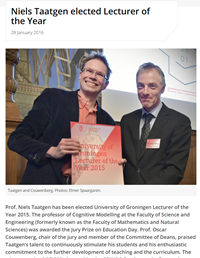Taatgen, prof. dr. Niels

Niels Taatgen studeerde informatica en psychologie aan de Rijksuniversiteit Groningen en promoveerde in 1999 op het proefschrift ‘Learning without limits’. Hierna was hij als universitair docent verbonden aan de afdeling Cognitiewetenschappen, later Kunstmatige Intelligentie, van de RUG. Na een periode waarin hij deels aan de Carnegie Mellon universiteit in Pittsburgh (VS) en de RUG werkte, is hij sinds 2009 hoogleraar Cognitive Modelling aan de RUG. Taatgen onderzoekt via computersimulaties het menselijk gedrag om te begrijpen hoe we ons in bepaalde situaties gedragen, bijvoorbeeld bij multitasken.
In 2011 ontving hij een Europese ERC-grant, van 1,5 miljoen euro. Taatgen kreeg dit voor onderzoek naar multitasking. Uitgangspunt was dat mensen in principe goed in staat zijn om te multitasken, maar dat dit soms spaak loopt omdat meerdere taken tegelijk hetzelfde hersengebied nodig hebben. Het onderzoek richtte zich met name op de vraag waarom mensen zo graag meerdere dingen tegelijk willen doen, en onder welke omstandigheden dit wel of juist niet veilig en productief is.
In 2016 werd Taatgen gekozen tot Docent van het Jaar van de RUG. Hij doceert over onderwerpen waarbij hij zelf actief betrokken is, wat te merken is aan zijn kennis van zaken en zijn enthousiasme.
Meer video's
-
Taatgen in 'Breingeheim' (uitzending over multitasken, Omroep Max)
Eerder in het nieuws

